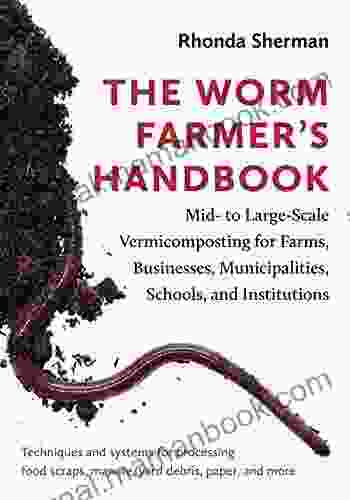Mid to Large Scale Vermicomposting: Empowering Farms, Businesses, Municipalities, Schools with Sustainable Waste Management

In an era marked by environmental challenges, the adoption of sustainable waste management practices has become paramount. Mid to large scale vermicomposting emerges as a transformative solution, empowering various sectors with an efficient and eco-friendly way to manage organic waste. This comprehensive article delves into the intricacies of mid to large scale vermicomposting, highlighting its benefits, design considerations, operational strategies, and the profound impact it has on our environment and communities.
Benefits of Mid to Large Scale Vermicomposting
Mid to large scale vermicomposting offers a multitude of benefits that extend beyond waste reduction. These include:
4.7 out of 5
| Language | : | English |
| Text-to-Speech | : | Enabled |
| Enhanced typesetting | : | Enabled |
| File size | : | 115652 KB |
| Print length | : | 239 pages |
| Screen Reader | : | Supported |
Enhanced Soil Health and Fertility:
Vermicompost, the end product of vermicomposting, is a nutrient-rich organic amendment that improves soil health and fertility. It contains high levels of beneficial microorganisms, enzymes, and plant growth hormones that enhance plant growth and yield.
Reduced Waste Disposal Costs:
Vermicomposting diverts organic waste from landfills, reducing disposal costs and the environmental impact associated with landfilling. It helps businesses, municipalities, and schools save significant amounts of money in the long run.
Environmental Sustainability:
Vermicomposting promotes environmental sustainability by reducing greenhouse gas emissions and conserving natural resources. Organic waste that would otherwise decompose anaerobically, releasing methane, is instead broken down aerobically by worms, producing carbon dioxide and water vapor.
Community Engagement and Education:
Mid to large scale vermicomposting projects can foster community engagement and environmental education. They provide opportunities for hands-on learning, promoting awareness about sustainable waste management practices and the importance of protecting our environment.
Design Considerations for Mid to Large Scale Vermicomposting
To ensure the success of mid to large scale vermicomposting operations, careful design considerations are essential:
Site Selection:
The site should have adequate space, drainage, and access to electricity and water. It should also be protected from extreme weather conditions and potential contaminants.
System Design:
The vermicomposting system should be designed to accommodate the volume of waste to be processed. Factors to consider include the type of waste, the number of worms required, and the desired production rate.
Materials Management:
A reliable source of organic waste is crucial for mid to large scale vermicomposting. The waste should be primarily composed of plant-based materials and free from contaminants.
Worm Species and Management:
Red wrigglers (Eisenia fetida) are commonly used in vermicomposting. They should be introduced to the system in sufficient numbers and managed to ensure their health and productivity.
Operational Strategies for Mid to Large Scale Vermicomposting
Effective operational strategies are vital for the successful implementation of mid to large scale vermicomposting:
Waste Preparation:
Organic waste should be shredded or chopped into small pieces to enhance decomposition and worm accessibility.
Feeding and Monitoring:
Worms should be fed regularly with an appropriate amount of waste. Temperature, moisture, and pH levels should be monitored and adjusted as necessary to optimize conditions for worm activity.
Harvesting and Processing:
Vermicompost is typically harvested every 3-6 months. It can be screened or processed to remove excess bedding materials and prepare it for use as a soil amendment.
Environmental and Community Impact of Mid to Large Scale Vermicomposting
Mid to large scale vermicomposting has a profound impact on both the environment and communities:
Reduced Greenhouse Gas Emissions:
By diverting organic waste from landfills and promoting aerobic decomposition, vermicomposting significantly reduces methane emissions, a potent greenhouse gas.
Improved Water Quality:
Vermicompost can help improve water quality by reducing nutrient runoff and filtering contaminants from water sources.
Community Revitalization:
Mid to large scale vermicomposting projects can revitalize communities by creating employment opportunities, promoting environmental stewardship, and fostering community engagement.
Case Studies: Vermicomposting in Action
Numerous successful mid to large scale vermicomposting projects worldwide demonstrate its effectiveness:
Ecojustice Vermicomposting Facility:
This facility in Vancouver, Canada, processes over 100 tons of organic waste annually, producing high-quality vermicompost for local farmers and gardeners.
San Francisco Compost Company:
This company operates a large-scale vermicomposting facility that processes over 20,000 tons of food waste each year, creating nutrient-rich compost for urban agriculture.
Melbourne Vermiculture Farm:
This farm in Australia produces over 1,000 tons of vermicompost annually, supplying it to commercial farmers and home gardeners, while also providing educational programs and community outreach.
Mid to large scale vermicomposting stands as a powerful solution to the challenges of organic waste management. By empowering farms, businesses, municipalities, and schools with sustainable practices, it promotes environmental health, reduces waste disposal costs, and fosters community engagement. With careful design, operational strategies, and a commitment to sustainability, mid to large scale vermicomposting can make a significant contribution to a greener and more sustainable future for generations to come.
4.7 out of 5
| Language | : | English |
| Text-to-Speech | : | Enabled |
| Enhanced typesetting | : | Enabled |
| File size | : | 115652 KB |
| Print length | : | 239 pages |
| Screen Reader | : | Supported |
Do you want to contribute by writing guest posts on this blog?
Please contact us and send us a resume of previous articles that you have written.
 Top Book
Top Book Novel
Novel Fiction
Fiction Nonfiction
Nonfiction Literature
Literature Paperback
Paperback Hardcover
Hardcover E-book
E-book Audiobook
Audiobook Bestseller
Bestseller Classic
Classic Mystery
Mystery Thriller
Thriller Romance
Romance Fantasy
Fantasy Science Fiction
Science Fiction Biography
Biography Memoir
Memoir Autobiography
Autobiography Poetry
Poetry Drama
Drama Historical Fiction
Historical Fiction Self-help
Self-help Young Adult
Young Adult Childrens Books
Childrens Books Graphic Novel
Graphic Novel Anthology
Anthology Series
Series Encyclopedia
Encyclopedia Reference
Reference Guidebook
Guidebook Textbook
Textbook Workbook
Workbook Journal
Journal Diary
Diary Manuscript
Manuscript Folio
Folio Pulp Fiction
Pulp Fiction Short Stories
Short Stories Fairy Tales
Fairy Tales Fables
Fables Mythology
Mythology Philosophy
Philosophy Religion
Religion Spirituality
Spirituality Essays
Essays Critique
Critique Commentary
Commentary Glossary
Glossary Bibliography
Bibliography Index
Index Table of Contents
Table of Contents Preface
Preface Introduction
Introduction Foreword
Foreword Afterword
Afterword Appendices
Appendices Annotations
Annotations Footnotes
Footnotes Epilogue
Epilogue Prologue
Prologue Roger Pierangelo
Roger Pierangelo Andrew Shaffer
Andrew Shaffer Melissa Balin
Melissa Balin Eg
Eg Cheryl Dozier
Cheryl Dozier Ronnie Burkett
Ronnie Burkett Alessandro Cuccuru
Alessandro Cuccuru Brett Allen
Brett Allen S Green
S Green J P Cianci
J P Cianci Sandy Alvarez
Sandy Alvarez Lara Zibners
Lara Zibners Isobel Miles
Isobel Miles Shanna Powlus Wheeler
Shanna Powlus Wheeler Andrew Jackson O Shaughnessy
Andrew Jackson O Shaughnessy J P Millsap
J P Millsap Thomas Sherlock
Thomas Sherlock Josie Ford
Josie Ford Oliver Taplin
Oliver Taplin Eloisa Ramos
Eloisa Ramos
Light bulbAdvertise smarter! Our strategic ad space ensures maximum exposure. Reserve your spot today!

 Grant HayesPoetic Insight Into My Very Unique Family: An Exploration of Love, Loss, and...
Grant HayesPoetic Insight Into My Very Unique Family: An Exploration of Love, Loss, and... Diego BlairFollow ·10.6k
Diego BlairFollow ·10.6k Brent FosterFollow ·17.3k
Brent FosterFollow ·17.3k Roland HayesFollow ·9.4k
Roland HayesFollow ·9.4k Sam CarterFollow ·12.8k
Sam CarterFollow ·12.8k John KeatsFollow ·17.9k
John KeatsFollow ·17.9k Philip BellFollow ·13.7k
Philip BellFollow ·13.7k Clark BellFollow ·15k
Clark BellFollow ·15k Richard WrightFollow ·17k
Richard WrightFollow ·17k

 Alexandre Dumas
Alexandre DumasFugitive Telemetry: Unraveling the Secrets of the...
In the realm of...

 Caleb Carter
Caleb CarterBlack Clover Vol 25: Humans and Evil - A Journey into the...
Unveiling the Sinister Forces Black...

 Israel Bell
Israel BellHow to Make Offers So Good People Feel Stupid Saying No
In today's competitive business environment,...

 Simon Mitchell
Simon MitchellWrath of Hades: The Children of Atlantis
An Epic Tale of...

 Percy Bysshe Shelley
Percy Bysshe ShelleyStrengthen Your Immune System: Fight Off Infections,...
What is the...

 Clark Bell
Clark Bell10 Things I Wish Someone Had Told Me Earlier
As we navigate through life, we accumulate a...
4.7 out of 5
| Language | : | English |
| Text-to-Speech | : | Enabled |
| Enhanced typesetting | : | Enabled |
| File size | : | 115652 KB |
| Print length | : | 239 pages |
| Screen Reader | : | Supported |










